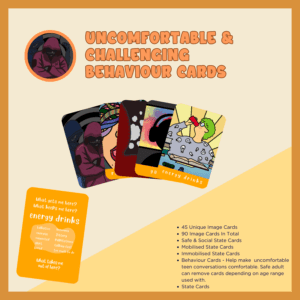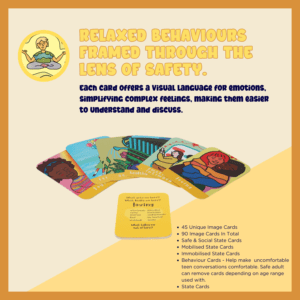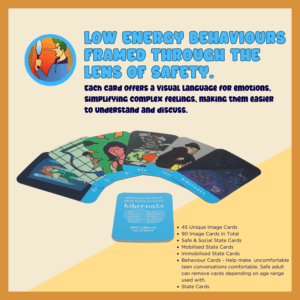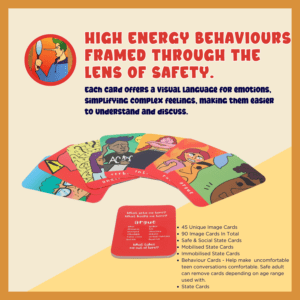The concept of “inner work” is often associated with reconnecting to our inner child – a younger version of ourselves that carries early experiences, emotions, and unmet needs.
But the idea of the “inner teen” is equally significant, especially as we reflect on the tumultuous period of adolescence, a time when we faced the challenges of identity, independence, and emotional development. For me personally – like so many others there was also immense trauma – I suddenly lost my father aged 13 which resulted in our family unit falling to pieces.
This article will explore what the inner teen is, why it’s important to do inner teen work, how it differs from the inner child, and how the Polyvagal Teen® Cards can help facilitate this process.
The inner teen represents the version of ourselves during adolescence – a time typically filled with emotional highs and lows, identity formation, rebellion, and seeking autonomy.
This phase of life is often marked by a need for independence, exploration, and validation from peers and authority figures. The experiences we encounter during these years can leave lasting impressions, forming critical parts of our self-identity, our coping strategies, and how we approach conflict, relationships, and self-esteem in adulthood.
Unlike the inner child, who carries our earliest developmental vulnerabilities, the inner teen also carries the more complex emotions related to independence, peer pressure, self-expression, and the desire to be seen and heard authentically.
Many of the emotional struggles from our teenage years may remain unresolved or even misunderstood, leading to challenges in adulthood, particularly around relationships, identity and self-worth.
Inner teen work helps us reconnect with this part of ourselves, providing an opportunity to reflect on those formative years with compassion and understanding. The emotional wounds from adolescence – whether from unmet needs, rejection, trauma, or confusion can continue to shape our adult behavior and mindset if left unaddressed.


While both the inner child and the inner teen represent earlier versions of ourselves, they carry different emotional landscapes and developmental needs.
The inner child is typically associated with early childhood experiences and emotions related to safety, love, and security. It reflects our early attachment experiences and vulnerabilities, including unmet needs for nurturing, affection, and validation.
The inner teen, on the other hand, represents the period of adolescence when we begin to push boundaries, seek independence, and form our own identity. The inner teen carries emotions related to autonomy, identity formation, social belonging, and navigating the complexities of self-expression. While the inner child often seeks comfort and protection, the inner teen may seek understanding, validation, and freedom.
You could say, inner teen work focuses more on identity, independence, and emotional intensity, while inner child work emphasises safety, love, and attachment.
The Polyvagal Teen Cards are an invaluable tool for inner teen work as they provide a structured way to explore emotions, behaviors, and states of the nervous system, all of which play a central role in the teenage experience.
These cards are based on Polyvagal principles, which explains how our nervous system responds to stress, safety, and connection. The theory outlines three states: the ventral vagal state (relaxed), the sympathetic state (mobilised), and the dorsal vagal state (immobilised). Teens, who often feel emotionally dysregulated, can benefit from understanding how their nervous system impacts their behavior and emotions.
Here are a few ways the Polyvagal Teen Cards can be used in inner teen work:
Identifying Emotional States: The cards help individuals identify and name the emotional states they experienced during their teenage years. Did they frequently feel in a fight-or-flight mode when interacting with peers or parents? Did they experience shutdowns during moments of overwhelming stress or shame? This awareness is crucial in understanding unresolved patterns.
Building Emotional Literacy: Adolescence is a time when many struggle to articulate their emotions, which often come out in the form of outbursts, withdrawal, or rebellious behaviors. The cards encourage users to develop emotional literacy, helping them reflect on how they responded to stress as a teen and how they might carry those responses into adulthood.
Self-Compassion and Reframing: Adults by revisiting their teenage years through the lens of the Polyvagal principles, individuals can cultivate self-compassion. Instead of viewing their teenage behavior as reckless or overly emotional, they can understand it as a nervous system response to overwhelming stimuli. This reframe is essential for healing.
Exploring Unresolved Conflicts: For adults the cards provide prompts that can lead to the exploration of unresolved conflicts from adolescence, including issues with authority, peer rejection, or identity suppression. By identifying the nervous system’s response to these conflicts, individuals can begin to heal old wounds and form healthier patterns in their adult lives.
Empowering Self-Regulation: Finally, the Polyvagal Teen Cards introduce tools and strategies for nervous system regulation that can be applied not only to current stressors but also to past unresolved emotions from the teenage years. Techniques like grounding, breathwork, and visualisation can help integrate the inner teen’s emotions in a way that fosters healing, acceptance and letting go of shame.
Working with the inner teen is an often overlooked but critical aspect of inner work. It addresses the complex emotional terrain of adolescence – one that shapes how we navigate independence, identity, and relationships in adulthood.
By using tools like the Polyvagal Teen Cards, adults can reconnect with their inner teen, explore their nervous system’s responses, and heal unresolved conflicts with greater compassion and understanding.
This process allows for a fuller integration of self, one that honors the unique and often tumultuous journey of growing up.



Driven to improve the emotional wellbeing of young people, adults, and parents, Yasmin Shaheen-Zaffar is the founder and creator of Polyvagal Teen®. She also developed The R.U.D Process® – a practical, step-by-step approach that helps teens and adults recognise and manage stress and anxiety by becoming Polyvagal Aware.
In addition, Yasmin leads several social-impact initiatives that promote steady, consent-based communication and co-regulation:
Glad We Talked® programmes
Neurosloth® Academy
Talky Talk Cards
Scribbledeedo®
World Stop Shouting Day – a campaign to reduce conflict and aggression in everyday interactions
Alongside this work, Yasmin runs a small private counselling practice in North Yorkshire and online, specialising in emotional regulation and working with neurodivergent, multi-faith, and mixed-heritage clients.